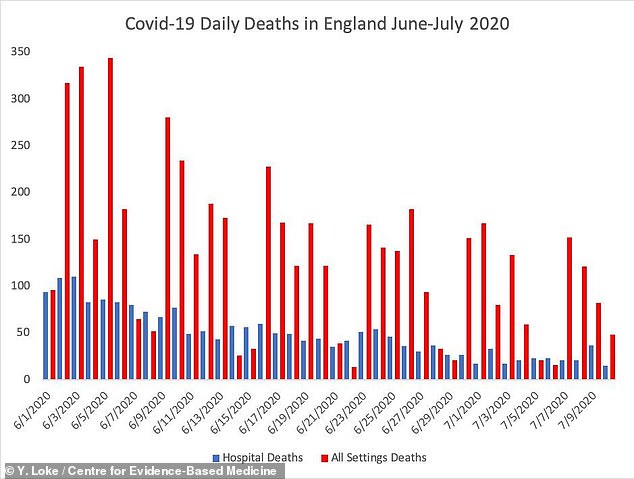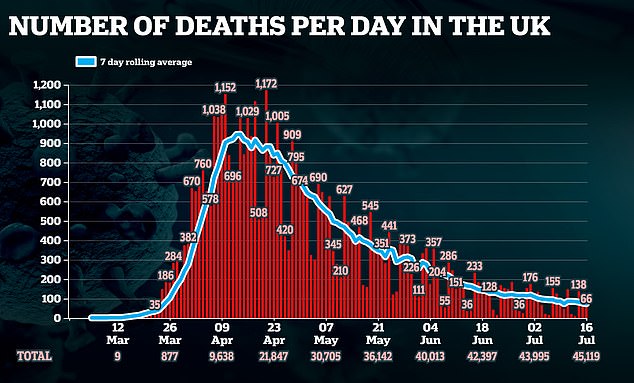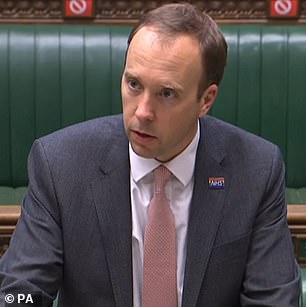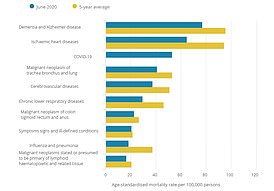Matt Hancock launches urgent review into fiasco at Public Health England as it’s revealed anyone who has ever died after testing positive for Covid-19 has been recorded as a ‘coronavirus death’ – even if they were hit by a bus
- Over 1,000 people may have had their deaths wrongly recorded as Covid-19
- Public Health England admits it does not have a time cut-off built into its records
- Someone who dies months after recovery is still classified as a Covid-19 patient
- ‘The public are worried that things aren’t getting better in England,’ expert said
Health Secretary Matt Hancock today ordered Public Health England to review the way it counts deaths because of a ‘statistical flaw’ that means officials are ‘over-exaggerating’ the daily toll.
PHE counts people as victims if they die of any cause any time after testing positive for Covid-19 – even if they were hit by a bus months after beating the life-threatening infection, top academics revealed last night.
The method is likely why the daily fatality tolls are not dropping quickly in England because survivors never truly recover from the disease as their deaths are blamed on the coronavirus – regardless of their real cause.
One of the leading experts who uncovered the flaw told MailOnline his ‘best guess’ was that more than 1,000 people have had their deaths wrongly recorded as caused by Covid-19.
Dr Yoon Loke, a pharmacologist at the University of East Anglia, warned that it is ‘not a good way of collecting data’, has had a significant impact in the past two months and is happening because PHE ‘chose a quick and easy technique’.
And the daily death tolls may not hit zero ‘for months to come’ because of a long tail of elderly people who beat Covid-19 but will die of other causes, Dr Loke added. He uncovered the flaw alongside Oxford University’s Professor Carl Heneghan.
Dr Loke said: ‘By this PHE definition, no-one with Covid in England is allowed to ever recover from their illness.’
Prime Minister Boris Johnson confirmed in a press conference today that the Health Secretary has ordered PHE to review the way it is counting people’s deaths.
It comes after a string of mistakes at PHE, including stopping testing and tracing at the peak of Britain’s outbreak. Tory MP David Davis this month told MailOnline the organisation had ‘made a complete mess’ of Covid-19 testing.

Dr Loke’s analysis shows that ‘all settings’ deaths (red bar) remain very high in England even as hospital deaths (blue bar) – which the Office for National Statistics says should make up two thirds of the total – have plummeted
A Department of Health spokesperson said today: ‘The Health Secretary has asked Public Health England to conduct an urgent review into the reporting of deaths statistics, aimed at providing greater clarity on the number of fatalities related to Covid-19 as we move past the peak of the virus.’
The way PHE counts victims on a daily basis works by it combing through records of people who have tested positive for Covid-19 in the past to see if they have died. If they have, their death is automatically added to the coronavirus count.
It means that if, for example, somebody tested positive in April but recovered and was then hit by a bus in July, they would still be counted as a Covid-19 victim.
Dr Loke pointed out that unless PHE changes its system, all 292,000 people who have tested positive so far will be added to the Covid-19 death toll when they eventually die.
The Department of Health, which uses PHE’s data for its daily announcements, has so far counted 45,119 fatalities with 66 announced yesterday.
The ‘statistical flaw’ should not drastically affect the total number of deaths but means the ongoing death tolls appear worse than the reality.
The Office for National Statistics – which is not affected by the counting method – has confirmed at least 50,698 people have died in England and Wales up to July 3.
Public Health England admitted it is counting the deaths of anyone who tests positive for Covid-19, regardless of how long afterwards they died.
Dr Loke said: ‘It seems that PHE regularly looks for people on the NHS database who have ever tested positive, and simply checks to see if they are still alive or not.
‘PHE does not appear to consider how long ago the Covid-19 test result was, nor whether the person has been successfully treated in hospital and discharged to the community.
‘Anyone who has tested Covid-19 positive but subsequently died at a later date of any cause will be included on the PHE Covid-19 death figures… even if they had a heart attack or were run over by a bus three months later.’
The pharmacologist, who published his findings in a blog post last night, said the bizarre way of recording deaths is why there are such wide variations in daily figures.

The number of deaths being announced each day is higher than the reality, scientists say, because not all of them actually died of Covid-19 – some tested positive weeks or months ago and died of other causes but are still included in the list

Health Secretary Matt Hancock has called for an urgent review into the way deaths are being counted by Public Health England
On Monday July 6, for example, 16 deaths were recorded, while 152 were announced the next day on Tuesday the 7th.
The Department of Health has blamed low numbers on Sundays and Mondays on a ‘weekend effect’ which means paperwork doesn’t get completed.
But academics are increasingly confused about why there are such wild variations, and why the number of deaths seems to remain so high.
And it appears to be simply that anyone who dies after being added to a register of people who have tested positive is classified as a victim.
It is currently impossible to know how many of the deaths announced by the Department of Health were not actually caused directly by Covid-19.

Dr Yoon Loke said the error has emerged because Public Health England chose a ‘quick and easy technique’
Dr Loke told MailOnline: ‘This is a very serious issue for public confidence.
‘When you go onto social media you will see hundreds of posts from rightly anxious people who are petrified at the seemingly relentless, unyielding daily death toll in England. The public are scared.
‘The public are asking questions about why England is doing so badly, when actually the truth is that the healthcare professionals in NHS are doing a great job in ensuring thousands of Covid survivors. The statistics here are misleading the public.
‘Because of this major flaw in the statistics, and the fact that tens of thousands of older people are being monitored, there is going to be a very very long tail of daily deaths.
‘The death toll will go down exceedingly slowly. It’s certainly not going to get to zero for months to come yet, because older people who have recovered from Covid-19 will unfortunately still succumb to other illnesses.’
Professor Carl Heneghan and Dr Jason Oke, Oxford University researchers who published Dr Loke’s work on their website, said that officials also seem to be spreading out historical deaths and just adding them on to ones that are happening now.
The pair pointed out the death counts from NHS England, which are accurate around three days after the date in question, are too low to match counts from PHE.
According to the Office for National Statistics, hospital fatalities now make up around 60 per cent of all deaths that happen on any given day.
On June 30, NHS England recorded 27 fatalities. If this was 60 per cent of all deaths that happened on that day the total number would be 45.
But the Department of Health, using PHE’s data, announced 115 more deaths on that day.
Dr Loke now suggests these massively inflated numbers are because PHE is counting people who died outside of hospital but didn’t die of coronavirus at all.
He wrote: ‘PHE data confirm that more than 125,000 patients have been admitted to NHS hospitals for Covid-19, the majority being successfully treated and discharged.
‘There are now less than 1,900 patients in hospital. So, roughly 80,000 recovered patients in the community will continue being monitored by PHE for the daily death statistics.
‘More and more people (who are mainly in the older age group) are being discharged to the community, but they clearly may die of other illnesses.’
Dr Loke said it would be a ‘reasonable approach’ to set a three-week limit on blaming someone’s death on coronavirus unless they were in hospital.
Public Health England told MailOnline that the World Health Organization has not defined a time limit for counting a death as caused by Covid-19, and said it ‘continues to keep this under review’.
It admitted that a coronavirus death is a death that happens to anyone who has previously tested positive, regardless of how long ago the test happened.
It said the ‘vast majority’ of Covid-19 deaths are correctly identified.
Dr Loke added: ‘This statistical flaw arose because PHE chose a quick and easy technique.
‘Their statistical method is reasonably accurate at the beginning of the pandemic, when there were not yet many people in the community who had survived Covid.
‘However, PHE did not – and have not yet – realised that glaring inaccuracies arise when tens of thousands of frail older people are discharged from hospital, and these Covid survivors unfortunately die from other, non-Covid related causes.
‘Like most things that are a quick fix, the monitoring system eventually churns out gibberish, and needs a thorough overhaul so that a lasting solution is implemented.’
Dr Susan Hopkins, Public Health England’s incident director, said: ‘Although it may seem straightforward, there is no WHO agreed method of counting deaths from Covid-19.
‘In England, we count all those that have died who had a positive Covid-19 test at any point, to ensure our data is as complete as possible.
‘We must remember that this is a new and emerging infection and there is increasing evidence of long term health problems for some of those affected. Whilst this knowledge is growing, now is the right time to review how deaths are calculated.’

